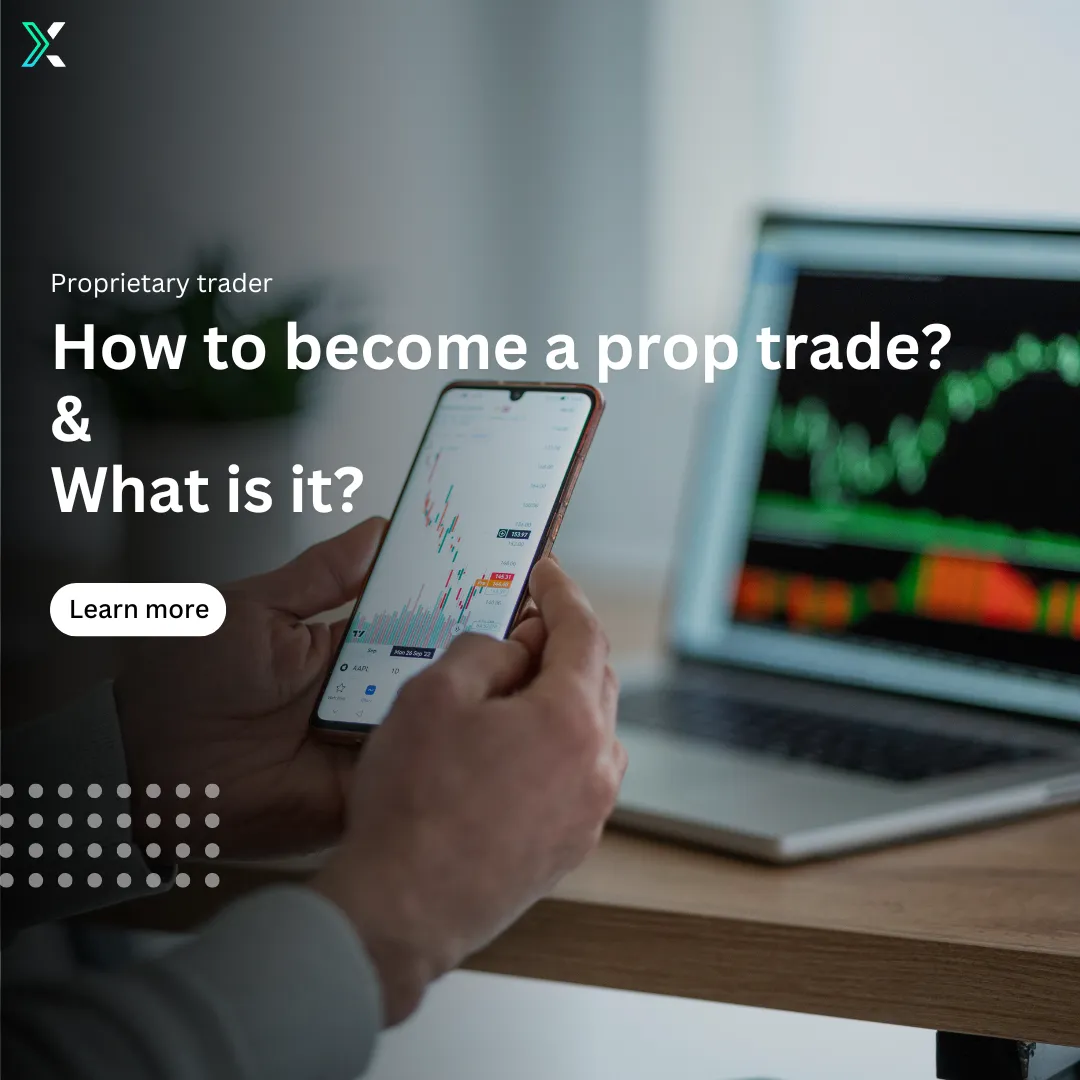The Intro – Proprietary trader:
In proprietary trading, a firm uses its capital to buy and sell securities, derivatives or any other financial instruments. This is different from brokerage firms that make deals on behalf of clients instead of relying on their own interests like in the case of proprietary trading companies.
These businesses often referred to as Forex proprietary firms outfits can vary from small standalone traders to expansive hedge funds. Proprietary traders are what we’ll be discussing in this post; how proprietary trading works, its benefits and how to become a prop trader.
How Does Proprietary Trading Work?
Proprietary trading is when financial firms use their own capital to trade stocks, bonds, currencies, or other financial instruments.The goal is to generate profit directly from market activities, rather than earning commissions from client trades. Advanced strategies and technologies are applied to find and exploit the market opportunities, increasing the firm’s profits.
Forex Proprietary firm comes with an intersection of various elements:
- Capital Allocation – The corporation decides how much money to assign to various investment techniques or markets.
- Risk Management – Risk management is done with strong systems that work to protect the organisation’s assets against anything that could happen. This involves setting up different risk tolerances, placing stop loss orders and continuously monitoring the state of the market so they are always updated.
- Trading Tactics – Within internal brokerage firms, various trading techniques are used including high level trading and complete basic analysis among all others.
- Technology – Modern trading platforms and analytical tools for the forex brokers are essential for efficient prop trading and data analysis.
Benefits of Proprietary Trading:
- Successful proprietary traders can earn substantial profits.
- Traders have autonomy in decision-making.
- The role demands a deep understanding of financial markets and constant learning.
Steps to Becoming a Forex Proprietary Trader!
To be a prop trader, you need to have skills, knowledge and determination all in one.
Here is a broad description:
Build a Strong Foundation:
- It’s your business to know the financial markets, economy and empirical evidence.
- Gather insights on technicals, fundamentals as well as risk management techniques including trading psychology too.
- Begin by prop trading on simulation accounts for first-hand experience.
Build a Track Record:
- Prop Trading should be done for constant earnings.
- Your capabilities can be illustrated through key performance indicators (KPIs).
Network with Industry Professionals:
- Take part in industry meetings and happenings.
- Get linked with others who work on trading as well as experts.
- Gain a network of good connections with firms that can hire one or join forces with others.
Seek Opportunities:
- Make applications with endorsed proprietary companies that supply cash forex broker schemes for their customers.
- You might want to start a brokerage firm of its own if you have enough capital as well as experience.
- Investigate areas of opportunities to hedge funds involving propriety exchanging.
Is Prop Trading Profitable?
Prop trading can be an extremely profitable venture, it entails a good deal of risk. The chances of success depend on many things: including understanding how the market operates; having excellent trading skills; managing risk effectively; and considering the state of the economy at large. While there are those who have made millions from trading, many others have lost everything they owned in the process.
Who is Suitable to Be a Proprietary Trader?
The ideal prop trader should have the following traits:
- Love for Markets – A real fascination with financial markets and prop trading.
- Analytical Mindset – Analytical Mind set means being able to systematically search anything that is happening on market and respond to it.
- Risk tolerance – Risk Management entails knowing how much risk one can afford to take or bear. When dealing with the uncertainties and as a result makes provision for probable losses.
- Trading skills – In trading, skills involve self-control or the quality of an individual to follow their trading plan without indulging into any emotion.
How can I become a Prop Trader?
Demonstrate your viability through the use of demo or live trading on a consistent basis. Submit applications to prop firms or engage in their challenges along with your startup. It is not universally applicable to everyone; the route taken by an aspiring prop trader varies from one individual to another.
The following are some of the common options:
Prop Firm Auditions:
In order to evaluate aspiring traders, numerous prop companies do organize auditions or challenges; The traders apply to the prop firm, mostly submitting a trading plan or strategy. During an audition, some specific risk management rules set by the firm have to be followed by traders. The applicants are evaluated based on the profitability and consistency of adherence.
Funded Trader Programs:
This includes programs which offer finances in exchange for profit sharing deals. When traders apply and get assessed on their trading strategy and experience. One undergoes an evaluation period where one trades on a demo account to prove their skills in trading and their profitability. Those traders who get successful get a funded account with capital provided by the prop firm.
Starting Your Own brokerage Firm:
If you’ve got enough money as well as experience, it is possible to launch your own agency for proprietary trades. Make the first step to mastering the market dynamics. Policy: Legally secure, transparent, regulatory compliant.
Final thoughts – Forex Proprietary firms:
Infrastructures commerce that uses a lot of prop trading data can also help in making big profits while it poses several dangers. This field may seem forbidding. However, those who are skilled in risk and understanding the complexities of the market can hope for high returns from their investments there if they possess adequate trading knowledge.
Remember, becoming a successful prop trader requires dedication, hard work, and continuous learning. Start with a solid foundation, build a track record, and actively seek opportunities in the industry.


Leave a Reply